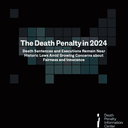
The American Bar Association’s Criminal Justice Section has announced its forthcoming annual report, The State of Criminal Justice 2023, examining the state of the American criminal legal system.
The annual publication includes a chapter devoted to significant developments in capital punishment, authored by Ronald J. Tabak, co-chair of the Death Penalty Committee of the ABA’s Section of Civil Rights and Social Justice and a longtime member of the Steering Committee of the ABA’s Death Penalty Representation Project. Mr. Tabak’s analysis highlights the continuing downward trend in death sentences and executions, as well as historically low public support of the death penalty; geographic factors that contribute to the arbitrary application of capital punishment; the impact of the U.S. Supreme Court in death row cases; and the continued push for death penalty reform at the local level.
Mr. Tabak highlights the few jurisdictions within the United States that have actively used the death penalty from 1977 to 2021. Just 34 of the country’s more than 3,000 counties “had sentenced to death half of those then on state death rows in the United States and only 2% of counties had sentenced 60.8% of those on state death rows in the United States.” Despite this lowered usage of the death penalty across the United States, three states, Texas, Oklahoma, and Virginia, which abolished the death penalty in 2021, account for more than half of all state executions since 1977. This continued geographic isolation of death sentences has not alleviated systematic unfairness. Quoting prominent capital punishment experts, Mr. Tabak includes that “the already pronounced geographic concentration of executions in a few active death penalty states” will be further exacerbated by the U.S. Supreme Court’s continued decline to issue stays of execution.
Notwithstanding the U.S. Supreme Court’s inaction in granting stays of executions, the Court has issued important rulings in other death penalty cases. In April 2023, the Court issued a ruling reversing the “Fifth Circuit’s holding that Texas death row [prisoner] Rodney Reed was barred by the statute of limitation from pursuing his effort to get access to and have tested DNA evidence that could exonerate him.” In an opinion written by Justice Kavanaugh and joined by Chief Justice Roberts, and Justices Kagan, Sotomayor, Barrett, and Jackson, the Court states that Texas’ “alleged failure to provide Reed with a fundamentally fair process was complete when state litigation ended and deprived Reed of his asserted liberty interest in DNA testing.” With the Court’s decision, Mr. Reed will have the opportunity to continue litigating his DNA testing request at the state level.
Mr. Tabak also notes the increasing number of state actors, including governors and elected officials, working to reform current death penalty systems. In 2021, the governor of Ohio, Michael DeWine, signed legislation that precludes the execution of those with serious mental illness. In April 2022, Kentucky governor Andy Beshear signed similar legislation, narrowing death penalty eligibility for those with severe mental illness. Both of these bills were enacted with bipartisan support. In early 2023, the Florida legislature passed a bill that if upheld by the U.S. Supreme Court, would permit non-unanimous jury recommendations for death sentences with an 8‑juror majority. According to Mr. Tabak, this new law “would make it much easier to impose death sentences and to execute people who could not have been sentenced to death under the Constitution as construed by the U.S. Supreme Court” and its decision in Hurst v. Florida, which previously found Florida’s non-unanimous sentencing scheme unconstitutional.
Assessing the future of the death penalty in the United States, Mr. Tabak writes “the more that people know about the death penalty as actually implemented, the more they oppose it. The actual capital punishment system in the United States can be justified only if one believes in arbitrarily and capriciously applied, highly erratic vengeance. More and more people are realizing that the typical pro-death penalty arguments, which focus on a theoretical but non-existent capital punishment system, are completely irrelevant.” He closes with a call for those who already oppose the death penalty to continue work towards its abolition.
Ronald Tabak, Capital Punishment, The State of Criminal Justice 2023, American Bar Association Criminal Justice Section, June 2023
See ruling in Reed v. Goertz here.
Note: Mr. Tabak is a member of the Board of Directors of the Death Penalty Information Center.


